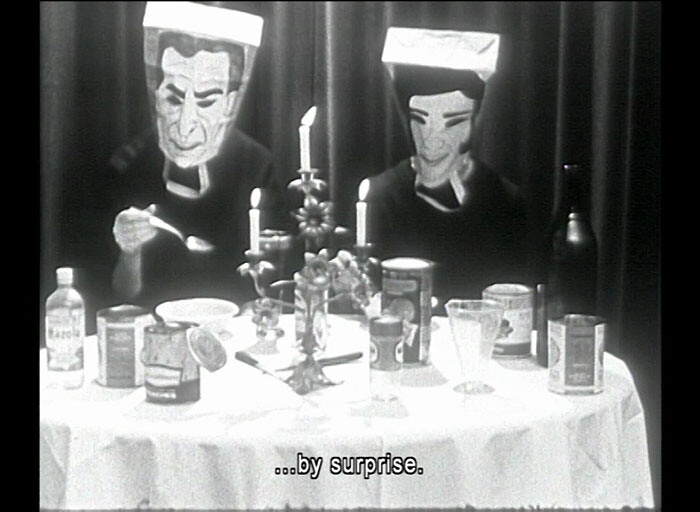This exhibition is one of the first since Harun Farocki’s unexpected death in July. In the absence of the artist himself, “4 films from 1967 to 1997” pays tribute to the man—chosen by his partner and collaborator, Antje Ehmann—who has been perhaps among the most influential artists and filmmakers of the second half of the twentieth century. However, this is a reputation gained by a modest and straightforward output, as is reflected by this presentation at àngels barcelona. Three of the works emerge from a single-channel video monitor and another is projected onto the wall. The unassuming atmosphere is the perfect setting for this 76-minute program bringing together examples from Farocki’s varying and strategic forms of narrative, from militancy to critique. The Words of the Chairman (1967) and Their Newspapers (1968) recall the agitprop and politically informed practices in art and film of the late 1960s; whereas Jean-Marie Straub and Danièle Huillet at Work on a film based on Franz Kafka’s “Amerika” (1983) and The Expression of Hands (1997) are representative of his strong and analytical approach to film culture.
This is the same gallery where early installations of Serious Games (2009–2010) and Parallel I-IV (2012–2014) were presented at different stages during their production, and so it comes as a surprise to look back through the work and see how austere and efficient Farocki’s first films were. Throughout his life Farocki traveled from low production values and their corresponding aesthetics to succinct visual compositions that evolved to the use of multiscreen devices and installations, and yet he remained faithful to a reflective practice of cinema, one that was essayistic and critical, and that allowed him to tackle urgent issues without becoming merely philosophical. In retrospect, seeing these films again makes clear that his early work and ideas conveyed more than just a political message: his urgent activist perspective required an analysis also of the new media regime that became apparent during America’s involvement in the Vietnam War, in which the newspapers mediated a direct and empirical experience of the real. Thus the documentary genre could no longer be based on the fact of witnessing events, and Farocki’s Their Newspapers is as much a critique of the manipulative role played by print media as an acknowledgement of documentary’s anaesthetizing distance. The subtitle of this 16 mm film, Some problems of anti-authoritarian and anti-imperialist urban warfare in the case of West Berlin, tells us something of Farocki’s desire to illuminate the specific conditions of production. The voice-over further underlines this: “The suffering of the Vietnamese people… An image of its suffering… Comes from Vietnam to Berlin.”
Watching Their Newspapers, one is easily reminded of November (2004), the much celebrated video essay by Hito Steyerl in which she comes to terms with her missing friend and activist Andrea Wolff, who was allegedly assassinated after joining the Kurdish resistance and subsequently became a heroic figure. The transit to performative documentary—between the 1960s and Steyerl’s work in Berlin 40 years later—enabled a new regime of image-making, one that was developed regardless of geopolitical frameworks, sedimented by Farocki’s work and furthered by a younger generation that were inspired by his radical approach. Artists like Steyerl, The Otolith Group, and Filipa César have transformed earlier experiments by Farocki into a genre of their own, a form of responsive practice that follows in his footsteps—Jean-Marie Straub and Danièle Huillet at Work on a film based on Franz Kafka’s “Amerika” is a film in which Farocki did something similar with his own mentors, the filmmakers Straub and Huillet. For him, cinema was advanced and constituted over time by collective achievements, passed on from one author to the next, like many cogs in a wheel.
Farocki’s appearance in the Straub and Huillet film—as an actor rehearing his lines and movements over and over—comes across as a cliché for a cinema that disciplines bodies, and has the potential to monitor attention—a kind of cinema that is no longer created by the camera but by the dispositif that demands a particular behavior from its viewers.1 The avant-garde formalism that pervades this particular piece—in which an obsessively repeated performance seeks to find a precise gesture and wording—is the perfect motive for a new conception of cinema that makes everything filmed become work. In this sense, Farocki’s task could be better described as undoing cinema. After all, it is significant that he envisioned his work as part of an encyclopedic endeavor: for him, cinema production was a hoarding of knowledge awaiting to be unveiled and institutionalized. What he did not realize was that he himself would become an institution that we would continue to praise for its unflinching criticality.
A term first used by Michel Foucault in The Confession of the Flesh (1977) to refer to the apparatuses and methodologies that maintain power.








